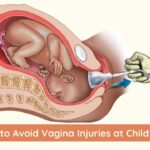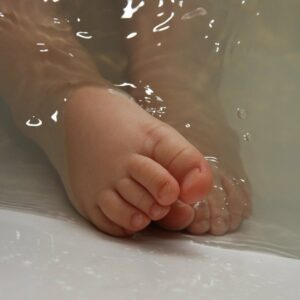How to Treat Baby Sore Throat

Sore or scratchy throats on their own are rarely a medical emergency, but for new and veteran parents alike, they can still be alarming. Your first move is to monitor and keep a close eye on the symptoms of your infant. Let the pediatrician know all of your baby\’s signs. This will help the doctor decide whether you need to bring your baby to be seen or whether you need to leave them at home to relax.
Common causes for sore throat in babies
In children, there are a variety of common causes of pain in the throat.
Common cold
In children, a sore throat is frequently caused by a respiratory infection like the common cold. Nasal irritation and a runny nose are the primary signs of a cold. These may be in addition to the symptoms of the sore throat you find in your baby. On average, as their immune system grows and matures, babies may have up to seven colds in their first year of life. If you suspect a chill in your kid, you might want to consider keeping them from child care at home if:
They\’ve got a fever; A common rule of thumb, and a rule in most child care centers, is to keep your baby home when they have an active fever and after the fever breaks for an additional 24 hours.
They seem awkward; Consider holding them home if your child is crying a lot or seems, unlike their usual selves. You\’ll want to review the policies of the center where your child attends daycare. They may have unique conditions to keep sick kids at home.
Tonsillitis
Tonsillitis, or inflamed tonsils, may be experienced by babies. Usually, tonsillitis is caused by a viral infection. If your baby has tonsillitis, feeding/swallowing anything might not be of interest to them. Also, they may:
- have problem swallowing
- drool often than normal
- fever
- a scratchy and loud cry
Your pediatrician may prescribe acetaminophen for infants or ibuprofen for infants, if necessary. If your baby is consuming solids already, they would need to stick to soft foods.
Hand, foot, and mouth disease
Diseases of the hand, foot, and mouth are caused by different viruses and are common in children under 5. A fever, sore throat, and mouth pain may be symptoms. Your baby can also have sores and blisters in her mouth. These can make swallowing difficult. A rash of red bumps and blisters will possibly even be seen on the hands, feet, lips, or buttocks of your infant. If required, your pediatrician may suggest fluids, rest, and infant acetaminophen or infant ibuprofen.
Diseases of the hand, foot, and mouth are very infectious. Keep your child home until the rash has healed, which can take 7 to 10 days, from child care facilities. Even if they are no longer acting like they\’re still sick after a few days, they’ll continue to be infectious until the rash has fully healed.
Strep throat
A type of tonsillitis that is caused by a bacterial infection is strep throat. While it is rare in children under three years of age, it is still a potential cause of throat pain.
A fever and very red tonsils can include symptoms of strep throat in infants. You can even find that their neck has swollen lymph nodes. Contact your pediatrician if you think your baby has strep throat. To diagnose it, they should carry out a throat culture. They can prescribe, if necessary, antibiotics.
When do you inform your Pediatrician?
If your child is younger than three months of age, call your pediatrician for the first symptoms of a sore throat, such as refusing to eat or remaining fussy after feeding. There is no fully developed immune system for newborns and infants under three months, so their pediatrician will want to see or track them. If your child is over three months old, call your pediatrician if, in addition to appearing to have a sore or scratchy throat, they have other symptoms, including:
- Unusual Cry
- High temperature (100.4°F (38°C))
- Persistent cough
- Not wetting diapers as usual
- Ear pain
- Rash on their hand, mouth, torso, or buttocks
If you need to bring your baby in to be seen, or if you can leave them at home and try home remedies and rest, your pediatrician would be better able to decide. You will also be consulted by the pediatrician on whether your child should be kept home from child care and how long they could be infectious.
If your baby is having trouble swallowing or breathing, always seek emergency medical attention right away. If they have unusual drooling, you can also seek emergency medical attention, which could mean they\’re having difficulty swallowing.
Home Sore Throat Remedies for Babies
Here are some home remedies that may be helpful for an infant with a sore throat.
Humidifier
It can help alleviate sore throat symptoms by setting up a cool-mist humidifier in the baby\’s room. If your baby has a stuffy nose, it can help them breathe better with the humidifier.
Set the humidifier away from your baby so they won\’t touch it, but they can feel the effects close enough. Hot-water vaporizers are and should not be used as a burn hazard. To prevent bacteria or mold from developing, you\’ll want to clean and dry your humidifier each day. It can make your baby sick. Until your baby\’s symptoms improve, you should use a humidifier, but let your pediatrician know if your baby isn\’t feeling better after a few days.
Suction (for three months to one year)
Babies are not in a position to blow their noses. You may use a suction bulb instead to suck out nasal mucus. To make it easier to remove it with suction, saline drops can help loosen up the mucus.
Frozen liquids (for older babies)
You may want to give them a frozen treat to soothe their sore throat if your baby has already started with solids. In a baby Popsicle mold, consider feeding your baby a formula Popsicle or frozen breast milk. Observe them look for signs of choking as they try this frozen treat.
Conclusion
Sore throats in babies are not meant to scare parents, but they should be treated with urgency. One quick way to ensure your baby is safe is to maintain hygiene all-around your baby and their surroundings. In most cases, babies are susceptible to infections via their immediate environment.







